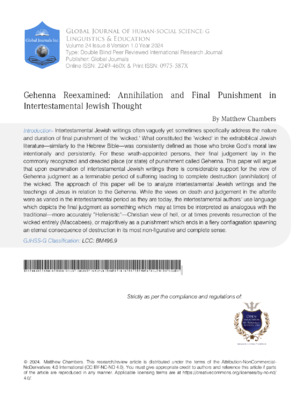Gehenna Reexamined: Annihilation and Final Punishment in Intertestamental Jewish Thought
Keywords:
Abstract
Intertestamental Jewish writings often vaguely yet sometimes specifically address the nature and duration of final punishment of the wicked What constituted the wicked in the extrabiblical Jewish literature similarly to the Hebrew Bible was consistently defined as those who broke God s moral law intentionally and persistently For these wrath-appointed persons their final judgement lay in the commonly recognized and dreaded place or state of punishment called Gehenna This paper will argue that upon examination of intertestamental Jewish writings there is considerable support for the view of Gehenna judgment as a terminable period of suffering leading to complete destruction annihilation of the wicked The approach of this paper will be to analyze intertestamental Jewish writings and the teachings of Jesus in relation to the Gehenna While the views on death and judgement in the afterlife were as varied in the intertestamental period as they are today the intertestamental authors use language which depicts the final judgment as something which may at times be interpreted as analogous with the traditional more accurately Hellenistic Christian view of hell or at times prevents resurrection of the wicked entirely Maccabees or majoritively as a punishment which ends in a fiery conflagration spawning an eternal consequence of destruction in its most non-figurative and complete sense
Downloads
How to Cite
References

Published
2024-11-04
Issue
Section
License
Copyright (c) 2024 Authors and Global Journals Private Limited

This work is licensed under a Creative Commons Attribution 4.0 International License.